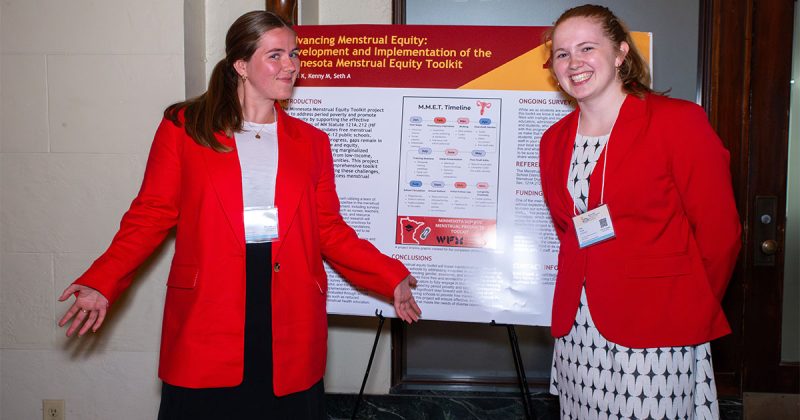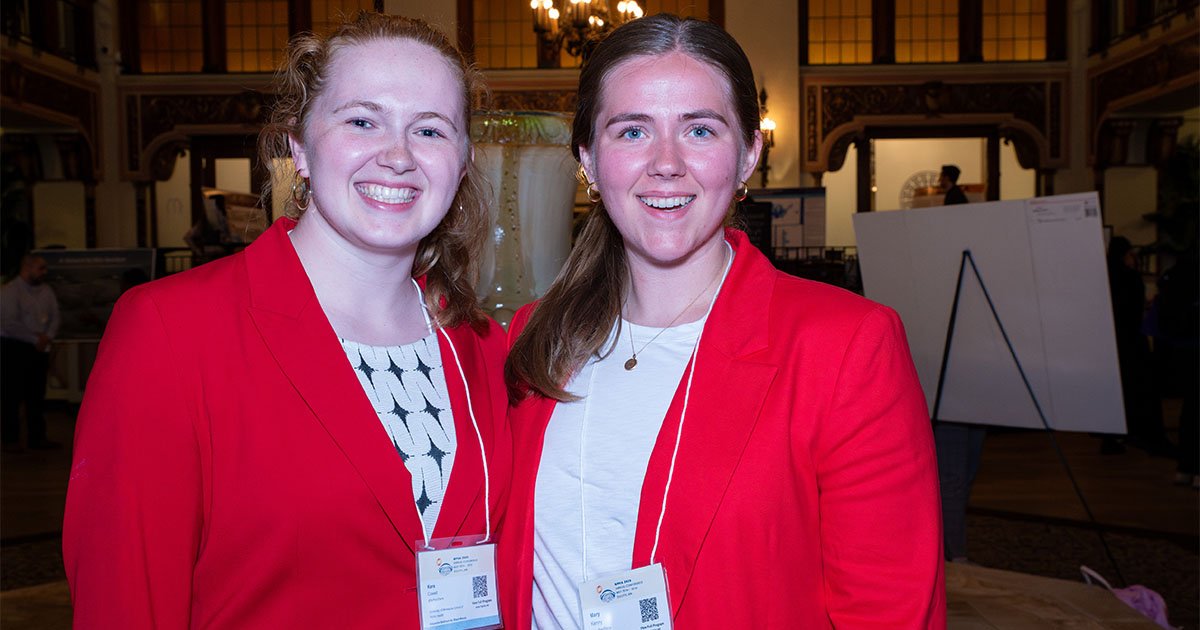Mary Kenny and Kara Cowell have each been passionate advocates for menstrual equity since high school, but it wasn’t until the first day of SPH’s new student orientation in 2024 that they actually met. “We all had to go around the circle and say what our niche interest area of public health was, and we both said ‘menstrual equity,’ ” Kenny said. Cowell said she was so surprised and excited to find another student with a shared passion: “I was like, wait, you’re involved in the menstrual equity space, too? Let’s figure out what we can do together!”
It turned out the two MPH students had plenty to do together. On August 12, Kenny and Cowell unveiled the Minnesota Menstrual Products in Schools Toolkit, a comprehensive resource meant to help school districts across the state implement a groundbreaking 2023 law requiring menstrual products in all Minnesota public school bathrooms. Since its passage, the law has been met with resistance in some quarters, and with confusion about its implementation by many school district administrators, educators, staff, and parents. Schools were essentially told they needed to place menstrual products in bathrooms, and beyond that, they were on their own. Kenny and Cowell’s 62-page toolkit—the culmination of months of organizing, listening sessions, data collection, and conversations with dozens of stakeholders across Minnesota—fills a critical need and helps educators across Minnesota better serve their students.
A shared passion
Given their backgrounds and common interest, it’s surprising that Kenny and Cowell had not met before. As high school students, both led organizations and fundraised for free menstrual products in their schools. While pursuing an undergraduate degree in child development in Boston, Kenny said she continually asked herself how she could best support the social, emotional, and physical health of students. “I kept coming back to menstrual equity,” she said, eventually writing her thesis on the topic.
As an undergrad at Saint Cloud State University, Cowell founded and led a student organization conducting drives for period products when she had a realization: “Collecting products and giving them out is great,” she recalled, “but I wanted to find something more sustainable.” That epiphany inspired Cowell to get more involved in policy work: She led implementation of a pilot program at St. Cloud State, and she testified alongside other students for the 2023 public schools legislation.
The 2023 law requiring menstrual products in all school bathrooms was a major victory for menstrual equity, and it placed Minnesota at the forefront of the issue nationwide. “Minnesota’s leadership role on menstrual equity is why I decided to come back to Minnesota and pursue a degree in public health in the state where I grew up. And to find Kara on that first day was such an awesome sign that this was the right decision,” Kenny said.
Identifying a need
Through their maternal and child health leadership class and classes in epidemiology and community health, both students kept returning to the issue of menstrual equity—and the clear gaps in the data surrounding the issue. “We both felt like this was such an important public health issue, but there was no data we could use to talk about it in epidemiology,” Cowell said.
The decision to use the 2023 law as the focus of their applied practice project was an easy one. “The whole point of our project was to create resources to support schools in implementing this legislation, because no one had really told them how to do it,” Cowell said.
The project had the enthusiastic support of faculty including Associate Professor Susan Mason and Associate Professor Zobeida Bonilla, as well as funding support from coalition partners including the Women’s Foundation of Minnesota, the Center for Leadership Education in Maternal and Child Public Health, and SPH’s Health Equity Work Group.
The first task was a needs assessment. To find out exactly what those needs were, Cowell and Kenny partnered with the Minnesota Menstrual Equity Coalition and Women’s Foundation of Minnesota to conduct a statewide survey of current implementation practices in schools. “The resounding feedback was that school staff supported the policy, but had no idea how to implement it. Is it the principal’s job? Is it the janitor’s job? Is it the health teacher’s job? The school nurse’s job? Where do schools order these products from, and how many do they need? Basically people said: just tell me what to do and we’ll do it,” Kenny recalled. That needs assessment led directly to the next phase of the project—in-depth interviews and meetings with dozens of school professionals and other stakeholders to gather qualitative insights.
The data and other feedback gathered by Cowell and Kenny informed the 62-page digital toolkit, which includes checklists, discussion guides, flyers, and one-pagers to help school staff, teachers, and nurses educate students about the law and help to normalize menstruation in schools. To ensure it’s culturally tailored, the information reflects insights from all Minnesota communities and includes take-home guides and other materials translated into Hmong, Somali, and Spanish.
Kenny lauded the School of Public Health for its essential role in the toolkit.
“So many people at SPH helped us with this project,” Kenny said. “The School of Public Health was a bridge builder, and they just kept being bridge builders throughout the project. Everywhere we went, they helped us find cultural partners for cultural community feedback and constant iteration, and that was essential to make this project what we wanted it to be.”
Looking ahead
Both women plan to stay involved in the movement for menstrual equity. Cowell and Kenny continue to volunteer with the Minnesota Menstrual Equity Coalition, which is exploring future legislative priorities, including expanded product access in public spaces and benefit programs. Both will also be heavily involved in the toolkit’s implementation over the coming months.

They also encourage other SPH students looking to make a difference. “If you see a need, there’s no reason you can’t help address it,” Cowell said. “I think it’s so cool that we were able to work with our partners and create such a valuable resource—I would encourage other SPH students to just give it a try because it might actually work out way better than you ever thought it could.”
The toolkit is being hosted on the websites of the Women’s Foundation of Minnesota, Honest Sex Ed Minnesota, and PERIOD.org.
A public webinar held on August 14 introduced the toolkit and offered implementation tips for school personnel across the state.

